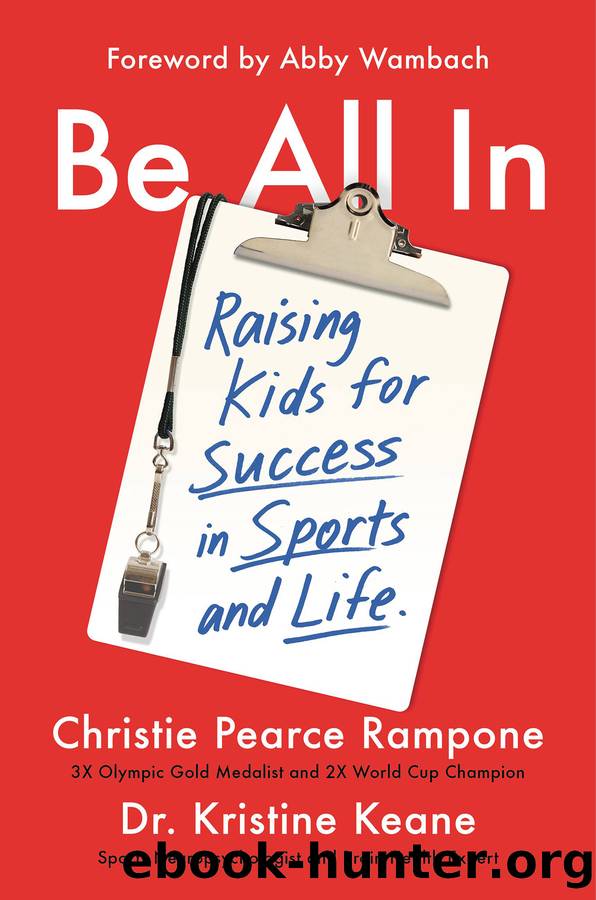Be All In by Christie Pearce Rampone

Author:Christie Pearce Rampone [Pearce Rampone, Christie]
Language: eng
Format: epub
Publisher: Grand Central Publishing
Published: 2020-08-18T00:00:00+00:00
Pay close attention to how you discuss mistakes on the car ride home. The teams that succeed are the ones that capitalize on mistakes. Teams win because an opponent surrendered a turnover, misplayed a ball, or gave a foul. Every athlete up to the pro level understands that they will make mistakes, regardless of the sport.
It is important to have a realistic and healthy relationship with athletic mistakes. If you use a critical voice when talking to your child, the conversation starters listed earlier might be beneficial. Some kids are naturally hard on themselves, and, for that reason, you must teach them to identify several positive moments in the game, even if the stats or the score aren’t necessarily reflective. Kids need to understand that their efforts can be productive even when they haven’t won the game, scored all the goals, or made the headlines. Teach them to see their mistakes as learning opportunities.
Avery had played on youth lacrosse teams since she was eight years old. At age sixteen, Avery was part of a high-level academy team. She was a starting attacker and loved by her coaches and teammates for her enthusiasm and perseverance. Her mother, Kelly, had been a high school athlete who understood the game of lacrosse; that said, Avery felt that her mother could not possibly understand the pressure she was under.
After games, Avery would vent.
“My teammates don’t pass the ball to me when they should. Sometimes I am wide open, but they think I can’t finish the job. They keep the ball to themselves or they pass it to someone else they think can do better. It’s so frustrating!”
Kelly would react to Avery’s emotional outbursts by encouraging her daughter to see her teammates’ perspective. “Maybe sometimes you don’t pass the ball back to them? Maybe you need to be more vocal? Try moving to a different spot on the field?”
Kelly’s suggestions were always met with more frustration, and eventually a heated argument would ensue. Kelly felt helpless, and Avery felt invalidated. All Avery heard was that her mother didn’t understand her feelings and was taking her teammates’ side. At sixteen years old, Avery was full of hormones, mood swings, and irrational thoughts.
Kelly eventually decided not to respond when Avery was so heated. Kelly simply allowed Avery to vent without interruption. She only asked questions to make sure she was hearing the situation correctly. She reflected on Avery’s words. She said things like “So it sounds like you are frustrated because no one passed you the ball today” and “You are angry because no one on the team followed the coach’s game plan?”
Kelly’s methodology worked. It calmed Avery down. When Kelly listened without judging, interpreting, or correcting, Avery’s postgame rants lessened. It just felt like talking. As Kelly continued to listen with curiosity, Avery felt safe to speak her mind and express her feelings.
Over time, Kelly was able to talk with Avery about her own perspectives on the game and how she might problem solve if she were in the same situation.
Download
This site does not store any files on its server. We only index and link to content provided by other sites. Please contact the content providers to delete copyright contents if any and email us, we'll remove relevant links or contents immediately.
Professional Troublemaker by Luvvie Ajayi Jones(29663)
Whiskey Words & a Shovel I by r.h. Sin(19394)
Rewire Your Anxious Brain by Catherine M. Pittman(18654)
Healthy Aging For Dummies by Brent Agin & Sharon Perkins RN(17045)
Cat's cradle by Kurt Vonnegut(15356)
Talking to Strangers by Malcolm Gladwell(13370)
The Art of Thinking Clearly by Rolf Dobelli(10489)
They Both Die at the End by Adam Silvera(9818)
The 5 Love Languages: The Secret to Love That Lasts by Gary Chapman(9815)
Doing It: Let's Talk About Sex... by Hannah Witton(9279)
The Compound Effect by Darren Hardy(8968)
Thirteen Reasons Why by Jay Asher(8910)
Goodbye, Things by Fumio Sasaki(8587)
Wonder by R.J. Palacio(8580)
Tools of Titans by Timothy Ferriss(8396)
Atomic Habits: Tiny Changes, Remarkable Results by James Clear(8344)
Becoming Supernatural by Dr. Joe Dispenza(8217)
Wonder by R. J. Palacio(8110)
Change Your Questions, Change Your Life by Marilee Adams(7783)
